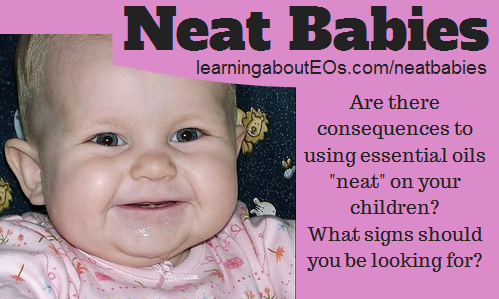
I saw yet another video today showing a family with young children using essential oils.
Mom passes them around for everyone to inhale…
Mom and Dad unscrew the caps, shake the oil on their hands, and rub them on their infants and children…
Mom adds them to her water…
Dad talks about leaving a legacy, and Mom says that even if the oil she is choosing is “not the best choice” that she has still done something positive…
Everyone smiles.
The Reality
Unfortunately, using essential oils around young children is not all sunshine and roses. Due to the high concentration of essential oils, there can be serious adverse consequences to using essential oils in this manner.
Children are particularly sensitive to aroma and products applied to the skin. A child’s immune system takes years to fully develop, making them less able to deal with the adverse effects which may arise when concentrated products are placed on the skin without dilution.

Essential oils are never recommended for use without first diluting, especially when using them on children. You can find dilution guidelines here: Properly Diluting Essential Oils.
Although it’s generally recommended to avoid using essential oils on children under age 2, even older children can react negatively to some essential oils. Eucalyptus and certain chemotypes of Rosemary should be avoided on children under age 10, and Peppermint for children under age 6 due to the possibility of slowed respiration caused by menthol and 1,8-cineole. It should not be used topically or diffused. Read more about that here: Menthol-Containing Essential Oils and Children.
An alternative to Eucalyptus and Peppermint: Anti-Germ and Anti-Congestion recipes.
Signs of Over-Use
Some adverse events can be seen right away. Redness, irritation, and itching are some signs that you are having an adverse reaction to essential oils. This could be due to using oxidized essential oils, not diluting the essential oil enough before applying to the skin, or using an essential oil that you are allergic to. Phototoxicity is another adverse reaction that can be prevented through proper dilution.
Sensitization is another thing altogether. Unlike allergic or irritant reactions which show up right away, sensitization may not occur for some time. Sensitization is a delayed reaction which involves the immune system, and is not reversible. Read more: A Word on Sensitization.

My biggest fear when I see the type of video described in my first comments, is that the children are going to grow up sensitized to essential oils and be unable to use them at all due to the over-use and lack of dilution when applied by the parents.
“Therapeutic Grade”
If you’re thinking that because you use “therapeutic grade” essential oils that your children are somehow protected, you will want to read my post Name Games. In this article you will learn that all essential oils, by definition, are therapeutic grade, and there is no official certification. Only self-certification.
Final Word
Please do your own research before using essential oils as presented by marketers who have a business to sell products. Our children rely on us to look out for their best interest. Lets not let them down.
Further reading
- Essential Oils and Children
- Safely Using Essential Oils for Children guest post over at the Herbal Academy of New England
- Clove Oil for Teething Babies: Busted Essential Oil Myth #1 guest post over at Food Renegade
| Lea Harris is a Certified Aromatherapist with Advanced Graduate training from Aromahead Institute in July 2013, but she is not a doctor. Please consult a trained aromatherapist or your doctor before using any of the suggestions on this website, as the user's age and health conditions must be taken into account before using. The information contained in this website is for informational purposes only, and should not be used as a substitute for professional medical advice. |


Comments
Powered by Facebook Comments